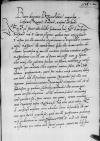⌊Bona⌋ Dei gratia regina Poloniae, magna dux ⌊Lithuaniae⌋, ⌊Russiae⌋, ⌊Prussiae⌋, ⌊Masoviae⌋ etc. domina.
Habuimus litteras reverendissimi domini ⌊archiepiscopi Rossanensis⌋, Tuae Paternitati litteris alligatas, quibus rogat atque ipsamet Paternitas Vestra pro illo intercedit, ut gubernium in temporalibus ⌊civitatis nostrae Rossanensis⌋ illi concederemus, quamdiu illic immoraretur, ut clerum licentiosius, quam par est, viventem facilius emendare posset. Respondimus iam ⌊illi⌋ nos id facere non posse, tum quod spirituales numquam ⌊illic⌋ gubernio saeculari uti soleant, tum etiam quod mense Augusti, quo civitatis illius capitanei mutari solent, alium capitaneum praefecerimus, quem sine ardua causa amovere nobis non licet. Sed et saeculares regimini spiritualium sese illic non ingerunt: habemus civitatem Licortaglie nuncupatam, vel ob id seditiosam, quod quidam cardinalis spiritualium illic curam agat, quam consilio aliquorum ab illo voluimus habere, ut civitas nostra pacatior sit, fieri tamen non potuit, verum mandavimus capitaneo nostro Rossanensi litteris nostris, quas eidem reverendissimo domino ⌊archiepiscopo⌋ misimus, ut in omnibus licitis et honestis illi, quoties opus fuerit, auxilio sit, quod ita illi profuturum putamus ac si gubernium ei concessissemus. Et Paternitas Vestra uti bonus consiliarius, qui rebus nostris favet ex aequo, poterit nos litteris suis
apud ⌊illum⌋ excusare nos id cum dignitate nostra citra seditionem et tumultum subditorum nostrorum facere non potuisse. Et bene valeat Paternitas Vestra.


